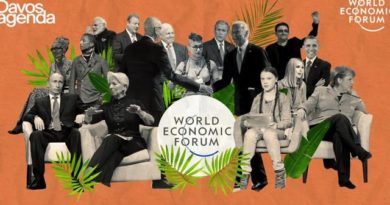This article was originally published by The Defender — Children’s Health Defense’s News & Views Website.
As the World Economic Forum (WEF) today wrapped up its weeklong annual meeting of nearly 3,000 political, business, media and academic elites, mainstream media largely continued to sing the meeting’s praises, while independent media outlets took aim at the WEF’s agenda and its promoters.
The Associated Press (AP) described the meetings in Davos, Switzerland, as taking on the “pressing global issues” while simultaneously being the “target of bizarre claims from a growing chorus who believe it involves a group of elites manipulating events for their own benefit.”
Among those critics was Twitter owner and CEO Elon Musk, who responded to a tweet: “WEF is increasingly becoming an unelected world government that the people never asked for and don’t want.”
Musk posted an online poll — that generated 2.42 million votes — where he asked whether “The World Economic Forum should control the world.” Eighty-six percent of respondents said “no.”
The Defender on Wednesday reported on the first few days of meetings. This article lists eight key takeaways from Davos — and why they matter.
ID2020’s founding partners include Microsoft, the Rockefeller Foundation, Accenture, GAVI, The Vaccine Alliance (a core partner of the World Health Organization, or WHO), UNICEF, the Bill & Melinda Gates Foundation and the World Bank.
Similarly, this year, Lawrence “Larry” Summers, who served as U.S. secretary of the treasury between 1999 and 2001 and director of the National Economic Council from 2009 to 2010, said “the odds in my view are better than 50-50” that “there will be a COVID-scale problem within the next 15 years.”
Summers made these remarks as part of a panel, “Global Economic Outlook: Is this the End of an Era?” whose panelists included International Monetary Fund (IMF) Director Kristalina Georgieva and former IMF managing director and current president of the European Central Bank Christine Lagarde.
During a press conference, officials presented the WEF’s “Global Cybersecurity Outlook 2023” report, predicting a “catastrophic cyber event” said to be “likely in the next two years.”
During another session, panelists predicted “humans will soon embrace implanted brain technology so they ‘can decode complex thought,’” adding that “neurosignals can be used for biometrics” and that the more widely adopted neurotechnology becomes, the more data can be gathered on humans.
Saudi Arabia’s Minister of Communications and Information Technology Abdulla Al-Swaha told attendees in Davos his country is “embracing metaverse technology [which] has already shown its environmental benefits with the planning and development of some of the Kingdom’s biggest projects.”
The WEF is a proponent of the metaverse, as previously reported by The Defender.
In an example of the behavioral psychology concept of “nudging,” Cepsa CEO Maarten Wetselaar advocated in favor of “much higher carbon prices,” in order to “make what you try to avoid expensive and subsidize the thing that you try to build.” He called this a “very capitalist intervention.”
Lawton noted that while it may seem odd for an oil and gas executive “to be so enthusiastic about transitioning away from oil and gas,” Cepsa “is also involved in green hydrogen and clearly sees the writing on the wall and wants some of those subsidies Wetselaar is calling for.”
Australian mining executive Andrew Forrest spoke in favor of “zero emissions, not just net-zero emissions,” saying this can be done using existing technology: “solar, wind, batteries, green hydrogen.”
The “15-minute city” concept, where people will be car-less, was also touted, while a member of Switzerland’s Green Party called for “punishing businesses that don’t adhere to climate agreements.” Indeed, a “5-minute city” proposal was also put forth, that would be “100% solar and wind-powered.”
Meat — or discouraging its consumption — was also on the agenda. Jim Hagemann Snabe, chairman of Siemens, said, “If a billion people stop eating meat, I tell you, it has a big impact. Not only does it have a big impact on the current food system, but it will also inspire innovation of food systems.” Snabe also advocated for synthetic meat.
“It was amazing the amount of misinformation that was there, and that information then went straight to the rest of the world … the way we normally deal with misinformation is we get the local chief, the local religious leader, the local healthcare workers who are trusted, but all of a sudden they’re like, ‘but look at what’s going on in Germany or in the U.S. or in other places, and here’s what I’m getting in my social media,’ and that has been a real problem.
“So the trust goes even broader. We don’t trust the institutions. We have misinformation, and it’s getting worse, not better.”
In another session, Pfizer CEO Albert Bourla said COVID-19 vaccines were “politicized” because people questioned whether they worked, and that this questioning was “constantly in our way.”





